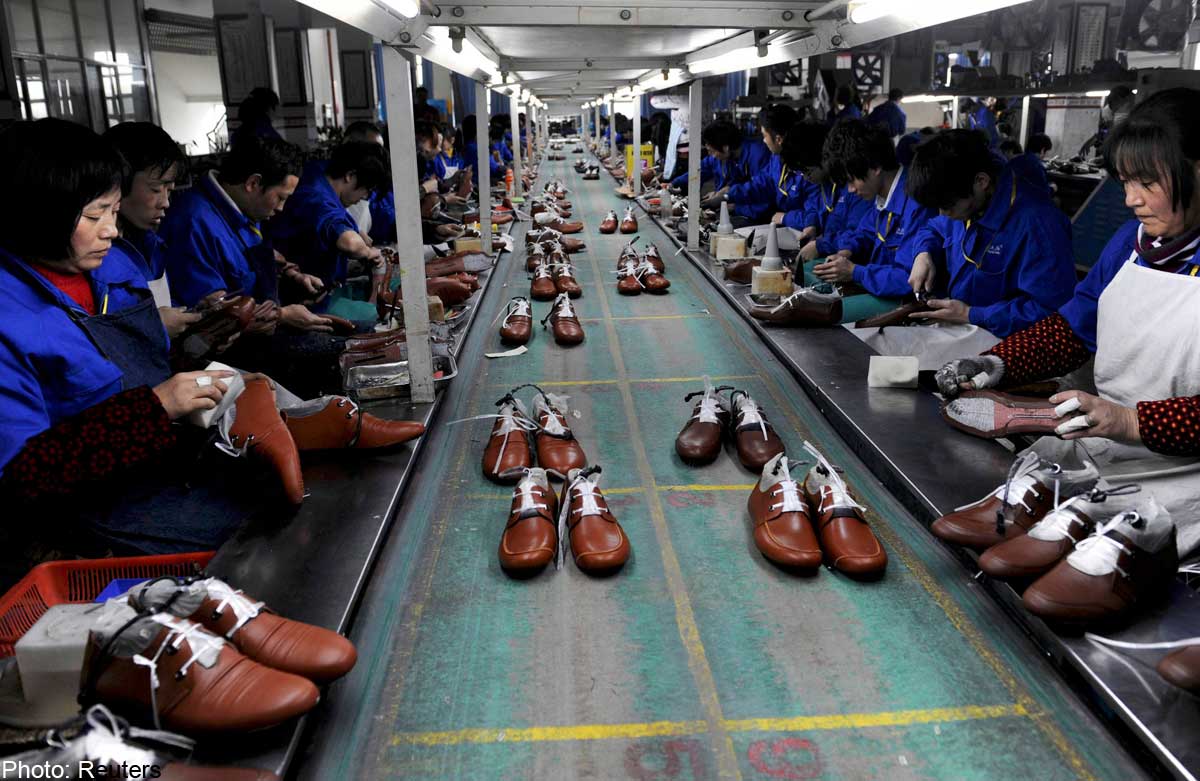Economy
Abia Gets $1.5b Shoe Factory Deal from China


By Dipo Olowookere
A $1.5 billion project for the establishment of a shoe industry in Aba, the commercial nerve centre of Abia State from Huajian shoe industry in Dongguan, Guangzhou, China has been brokered by the state Governor, Mr Okezie Ikpeazu.
The Abia-Huajian Shoe Industrial City, which will be located in Aba, will have capacity to produce 5,000 shoes per day and employ about 10,000 people directly and indirectly.
It was learnt that the state government will provide the land and other investment incentives for the project, while the Huajian Group will fund the entire project.
The Governor, in a statement issued today by his Chief Press Secretary, Mr Enyinnaya Appolos, said the deal was secured during a meeting with the Chairman of the Huajian Group, Mr Zhang Huarong, in the course of his official visit to China for the 1st Nigeria-China Governors Investment Forum.
Mr Huarong, who noted that Mr Ikpeazu was the first Nigerian leader to visit him, disclosed that the Huajian Group was already employing 6,000 staff and is currently developing a 250 Acre Industrial City in Ethiopia and expressed his eagerness to come to Nigeria.
Huajian Group currently employs about 20,000 staff in China and operates a 10,000 shoes per day Factory in Dongguan valued at $2 billion.
Mr Huarong assured that he will visit the Governor in Abia before the end of April 2017 for further discussion on the project.
Economy
Nigerian Insurance Firms Pay Out N564bn Claims in Q3 of 2024

By Aduragbemi Omiyale
Underwriting companies in Nigeria have continued to show their willingness to deepen insurance in the country by changing the wrong perception of people about the sector.
Data released by the National Insurance Commission (NAICOM) on Monday showed that in the third quarter of 2024, insurers paid about N564.1 billion as claims, representing 48.1 per cent of the total premiums generated between July and September.
According to the regulator, the life insurance segment recorded an impressive claims settlement ratio of 81.6 per cent versus 73.6 per cent in the non-life segment achieved 73.6 per cent.
“The ratio of net claims paid demonstrated strong performance across various business classes. Motor Insurance achieved an outstanding ratio of 92.3 per cent, followed by Miscellaneous at 88.9 per cent.
“General Accident and Fire businesses recorded 86.3 per cent and 75.1 per cent, respectively. The oil & gas business, while lower at 63.7 per cent, showed significant progress compared to 43.1 per cent recorded in the corresponding period of the previous year,” a part of the report stated.
It was revealed that during the review period, the total assets in the sector grew by 5.15 per cent to N3.88 trillion from N3.69 trillion in the second quarter of last year, with the non-life business accounting for N2.34 trillion and the life business contributing N1.54 trillion.
Also, the gross premium written went up by 44.3 per cent to close at N1.17 trillion, with the non-life sector accounting for 68.9 per cent at N808.4 billion and the life segment accounting for 31.1 per cent at N362 billion.
“The industry indeed has demonstrated some significant level of robustness, profitability, and stability as established by the performance in premium generation, favourable net loss ratios, substantial market expansion, and a competitive operating environment.
“More importantly, is the favourable outlook of the market owing to the ongoing regulatory policy direction in terms of sector-wide process automation, market deepening measures, and a sustainable legal framework improvement,” the report stated.
Economy
Risevest Engages SEC After Risk Warning

By Adedapo Adesanya
Risevest, a digital investment platform that specialises in stock trading, is engaging Nigeria’s Securities and Exchange Commission (SEC) regarding recent warnings about its cooperative subsidiary’s operations in the Nigerian capital market.
In a statement sent to customers, the platform addressed concerns about Risevest (Victoria Island) Cooperative Multipurpose Society Limited, confirming that while this entity operates under the Lagos State Cooperative Society Laws with Registration No 17080, its broader Nigerian operations are conducted through authorized channels.
“Our Nigerian operations are covered by our trusteeship with Meristem Trustees Limited, an SEC-licensed private liability company, as well as our licensed local subsidiary Chaka Technologies Limited, a digital sub-broker licensed by SEC,” the company stated.
The investment platform emphasised that these structures legally enable them to manage and invest users’ funds in both local and global investment markets.
According to Risevest, they have initiated communication with the SEC to address and resolve the concerns raised in the regulatory body’s statement.
The regulator cautioned Nigerians against engaging in investment transactions with two unregistered platforms—Risevest Cooperative Multipurpose Society Limited and Stecs Multipurpose Cooperative Society, commonly referred to as Stecs.
SEC warned that engaging with unregistered and unregulated entities in the capital market exposes investors to significant risks, including fraud and the potential loss of funds.
However, Risevest maintained that all its services continue to operate normally, assuring stakeholders of its commitment to regulatory compliance.
“We welcome and have always operated in line with the guidelines established by regulators to safeguard consumers,” the statement noted.
Economy
Impresit Bakolori, Okitipupa Expand NASD Index by 0.15%

By Adedapo Adesanya
The duo of Impresit Bakolori Plc and Okitipupa Plc raised the NASD Over-the-Counter (OTC) Securities Exchange by 0.15 per cent on Monday, January 27.
Data showed that Impresit Bakalori Plc increased its value by 10 Kobo during the session to N1.05 per unit from the 95 Kobo per unit it ended last Friday, and Okitipupa Plc appreciated by N5.27 to end the session at N57.96 per share versus N52.69 per share.
As a result, the market capitalisation of the platform went up by N2.64 billion to close at N1.777 trillion compared with the preceding session’s N1.775 trillion and the NASD Unlisted Security Index (NSI) gained 4.67 points to wrap the session at 3,137.87 points compared with 3,133.20 points recorded in the previous session.
Yesterday, there was a rise in the volume of securities traded by investors by 504.4 per cent as they transacted 98.8 million units of stocks compared with the 16.3 million units of securities transacted in the previous trading day.
Equally, there was a surge in the value of shares traded during the trading day by 973.3 per cent to N109.8 million from the N10.2 million recorded in the preceding session.
Further, there was a marginal increase in the number of deals completed at the bourse on Monday by 4.4 per cent to 24 deals from the 23 deals executed last Friday.
When the market closed for the session, Impresit Bakolori Plc was the most active stock by value (year-to-date) with 406.5 million units worth N386.1 million, followed by FrieslandCampina Wamco Nigeria Plc with 4.3 million units valued at N170.4 million, and Geo-Fluids Plc was in third with 9.1 million units sold for N44.3 million.
Impresit Bakolori Plc was also the most active stock by volume (year-to-date) with 406.5 million units worth N386.1 million, as the second spot was taken by Industrial and General Insurance (IGI) Plc after trading 26.3 million units for N6.3 million, and Geo-Fluids Plc came next with 9.2 million units valued at N44.3 million.
-

 Feature/OPED5 years ago
Feature/OPED5 years agoDavos was Different this year
-
Travel/Tourism8 years ago
Lagos Seals Western Lodge Hotel In Ikorodu
-

 Showbiz2 years ago
Showbiz2 years agoEstranged Lover Releases Videos of Empress Njamah Bathing
-

 Banking7 years ago
Banking7 years agoSort Codes of GTBank Branches in Nigeria
-

 Economy2 years ago
Economy2 years agoSubsidy Removal: CNG at N130 Per Litre Cheaper Than Petrol—IPMAN
-

 Banking2 years ago
Banking2 years agoFirst Bank Announces Planned Downtime
-

 Sports2 years ago
Sports2 years agoHighest Paid Nigerian Footballer – How Much Do Nigerian Footballers Earn
-

 Technology4 years ago
Technology4 years agoHow To Link Your MTN, Airtel, Glo, 9mobile Lines to NIN













2 Comments